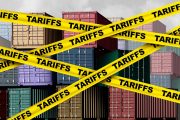
A week ago both Mississippi Republican senators, Thad Cochran (left) and Roger Wicker (right), announced their support of S.B. 2205 — the Second Amendment Sovereignty Act of 2012 — that would allegedly protect American citizens from any abrogation of their Second Amendment rights if the UN Arms Trade Treaty was signed by Secretary of State Hillary Clinton in July. That makes a total of 17 senators who are supporting the bill.
The bill, identical to one offered in the House, would “prohibit funding to negotiate a United Nations Arms Trade Treaty that restricts the Second Amendment rights of United States citizens.” The bill notes the threat being imposed by the Obama Department of State and its secretary, Hillary Clinton:
Congress makes the following findings:
(1) In October 2009, Secretary of State Hillary Rodham Clinton announced the United States support and participation in negotiating the United Nations Arms Trade Treaty, to be finalized in 2012, signaling a shift in United States policy.
(2) An Arms Trade Treaty that regulates the domestic manufacture, possession, or purchase of civilian firearms and ammunition would infringe on the rights of United States citizens protected under the second amendment to the Constitution of the United States.
It is the sense of Congress that the sovereignty of the United States and the constitutionally protected freedoms of American gun owners must be upheld and not be undermined by the Arms Trade Treaty.
No funds may be obligated or expended to use the voice, vote, and influence of the United States, in connection with negotiations for a United Nations Arms Trade Treaty, to restrict in any way the rights of United States citizens under the second amendment to the Constitution of the United States, or to otherwise regulate domestic manufacture, assembly, possession, use, transfer, or purchase of firearms, ammunition, or related items, including small arms, light weapons, or related materials.
Senator Cochran said, “This legislation sends the Obama administration a very clear signal that it must be vigilant about protecting those rights,” while Senator Wicker noted, “The Arms Trade Treaty must not be used as a backdoor approach for limiting the lawful right to bear arms.” In responding to one of his constituent’s concerns about the UN treaty to be finalized in July, Senator Johnny Isakson (R-Ga.) added: “I would never support any international agreement that would undermine the Second Amendment rights of American citizens in any way…As a member of the Senate Committee on Foreign Relations [to which the bill was referred], I will continue to explore ways to reduce international violence without making the United States party to any agreement that would undermine our own Constitution.”
Unfortunately, these senators may have little say in the matter, due to a constitutional loophole discovered and explored in detail by scholars Joseph Bruce Alonso and David Kopel. In his treatise, Alonso points out that conflicts between international law and the U.S. Constitution are likely to be resolved in favor of international law, even if the Senate fails to ratify the UN treaty, while Kopel noted in his study that
The United Nations…[has] declared that there is no human right to self-defense or to the possession of defensive arms. The UN…further declare[s] that insufficiently restrictive firearms laws are themselves a human rights violation, so all governments must sharply restrict citizen firearms possession…
The anti-self-defense and anti-firearms ownership mandates from the United Nations are unlikely to be directly adopted as law by Congress or by state legislatures in the United States. Nevertheless, there are a variety of ways…in which purported international law mandates can be imposed on American citizens without legislative consent. [Emphasis added.]
It is likely that most advocates and supporters of the Second Amendment know that unless a treaty is ratified by two-thirds of the Senate, it fails to have any legal effect on American citizens. This confidence comes from Article II, Section 2 of the Constitution, to wit:
He [the President] shall have Power, by and with the Advice and Consent of the Senate, to make Treaties, provided two-thirds of the Senators present concur…
According to Alonso that is a thin reed upon which to rely. In his study he remarks, “The ways in which the rights of private United States gun owners could be infringed are endless.” For example,
The first way is the possibility that the President of the United States signs [a treaty]…Signature by a United States President would indicate to the international community that the United States intends to abide by the gun control laws, with or without ratification by the Senate. [Emphasis added.]
A second way these gun control laws could affect United States parties is in the event that gun control becomes a customary international law. Even if the United States did not sign on to [a] treaty, if the United States began to abide by [it], the United States may, in effect, be consenting to [that treaty] becoming customary international law. In the eyes of an international court, the United States, by following the treat[y], is consenting to be bound by the treaties in the future.
Kopel agrees that a mere signature by the president would be sufficient to enact such a treaty, regardless of opposition by Congress. Kopel explains: “The United States Supreme Court has cited unratified treaties … as guidance for interpreting United States constitutional provisions.”
What’s especially frightening is the current president’s propensity to sign, arbitrarily and unilaterally, numerous Executive Orders (EOs) to put in place his policies without the necessity of consulting Congress. To date he has issued 128 EOs, the latest concerning deportation of children of illegal immigrants residing in the United States.
Faced with the increasing likelihood that Obama won’t have a second term to complete his agenda to turn the country into a European socialist society, complete with gun control laws, what would keep him from issuing an EO approving the UN Arms Trade Treaty in July?




